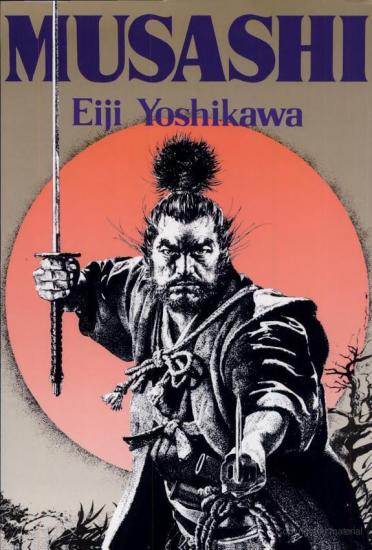
Rating: Not rated
Tags: Samurai, Lang:en
Summary
The classic samurai novel about the real exploits of the
most famous swordsman. Miyamoto Musashi was the child of an era when Japan was
emerging from decades of civil strife. Lured to the great
Battle of Sekigahara in 1600 by the hope of becoming a
samurai - without really knowing what it meant - he regains
consciousness after the battle to find himself lying
defeated, dazed and wounded among thousands of the dead and
dying. On his way home, he commits a rash act, becomes a
fugitive and brings life in his own village to a standstill -
until he is captured by a weaponless Zen monk. The lovely Otsū, seeing in Musashi her ideal of
manliness, frees him from his tortuous punishment, but he is
recaptured and imprisoned. During three years of solitary
confinement, he delves into the classics of Japan and China.
When he is set free again, he rejects the position of samurai
and for the next several years pursues his goal relentlessly,
looking neither to left nor to right. Ever so slowly it dawns on him that following the Way of
the Sword is not simply a matter of finding a target for his
brute strength. Continually striving to perfect his
technique, which leads him to a unique style of fighting with
two swords simultaneously, he travels far and wide,
challenging fighters of many disciplines, taking nature to be
his ultimate and severest teacher and undergoing the rigorous
training of those who follow the Way. He is supremely
successful in his encounters, but in the Art of War he
perceives the way of peaceful and prosperous governance and
disciplines himself to be a real human being. He becomes a
reluctant hero to a host of people whose lives he has touched
and been touched by. And, inevitably, he has to pit his skill
against the naked blade of his greatest rival. Musashi is a novel in the best tradition of Japanese story
telling. It is a living story, subtle and imaginative,
teeming with memorable characters, many of them historical.
Interweaving themes of unrequited love, misguided revenge,
filial piety and absolute dedication to the Way of the
Samurai, it depicts vividly a world Westerners know only
vaguely. Full of gusto and humor, it has an epic quality and
universal appeal. The novel was made into a three-part movie
by Director Hiroshi Inagai.